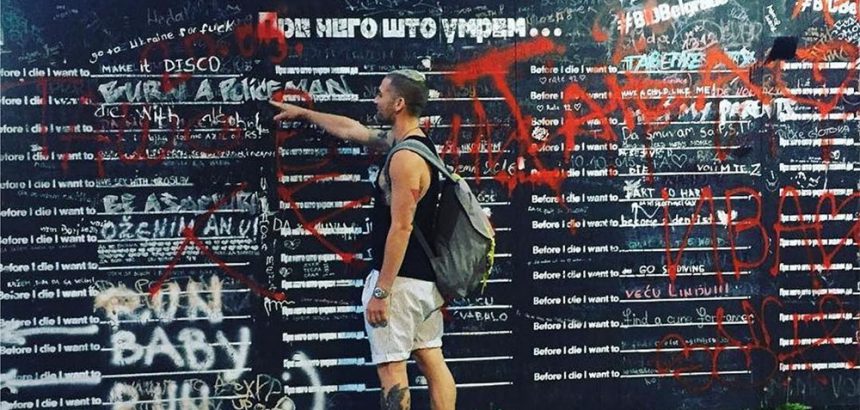i’ve spent the majority of this year living and writing in berlin. explaining why has been challenging—something about my desire to get out of toronto for a while tweaks a “but really guys aren’t we a world-class city?” nerve that toronto always seems to have exposed. (don’t worry, yes, we are, we just really need to work on the TTC).
maybe it’s been hard for me to explain because my own reasons are hard to admit. i had a great year last year, got to work on a lot of really exciting projects, and somehow still made it to the end of the year exhausted, angry, and drained of hope. for the first time in my theatre career, i’ve felt my faith in the viability of theatre—especially theatre in canada as i once hoped to practice it—begin to waver.
so i ran off to a magic fairy-tale land where the arts are regarded as a fundamental aspect of civic participation and the nightlife feels both more laid back and energized at once. on top of having to procrastinate on a bunch of writing, i also wanted an injection of hope, and i badly needed some time to reflect on where and how one should make theatre (if one should make it at all).
berlin is a nice insulated little bubble for theatre makers. the theatres here are vital and well-attended, and the demographic spread within the audiences is pretty impressive (i wrote a “failed manifesto” for this blog a couple years back while doing a residency here, which attempts to outline some of the historical particulars that have created this situation, and how they’re not really replicable in canada). it’s a good place to come when i feel like i’m hoarse from screaming into a vacuum. it’s also a pretty great place to be gay (sadly not the subject of this piece).
########
it’s no secret that canadian theatre has an audience problem. it’s not that there aren’t people in canada who are passionate consumers of theatre—in fact, when i go to shows, i often see faces i recognize from previous shows. the problem is that i see too many of them. our audience has a ceiling—most shows are populated by a mixture of a) theatre professionals, b) that particular theatre’s base of ‘regulars’ (sometimes subscribers), and c) the die-hard loyalists who manage to make it out to an extraordinary number of shows.
this year seems to be particularly bad: talking to several artistic directors, there’s a cloud that’s come over the conversation at some point: [in a confidential tone] “it’s a really hard year. numbers are down—way down.” i could speculate endlessly about why this is—blame fear, blame populism, blame rocket boy, blame #45, blame global political instability, blame netflix, youtube, reality TV, blame the current batch of programming which was largely decided upon before world politics took a turn for the horrifying and seems strangely, blame el niño, solar flares, earthquakes, hurricanes, or the impending rapture.
but even without 2017’s downturn, i’ve always found it more than a little depressing that a responsible project grant budget forecasts audiences at 50% of capacity—especially because that’s usually realistic.
doug saunders’ recent book, maximum canada, suggests that canada actually has a population deficit. we just don’t have the critical mass of people in canada to create a robust society, which includes audiences for arts and culture (as well as labour forces, clusters of expertise, and cities in general). i think he’s maybe onto something, but metro toronto also has a population of 5.9 million, and toronto proper 2.8 million. that’s roughly the same size as rome and only a little smaller than berlin’s 3.6 million. surely there must be a potential audience in there?
it’s not that canadians don’t see the value of live performance, or arts and culture in general—research and surveys repeatedly show 80-90% of canadians agreeing with statements like “arts and culture make a community a better place to live,” “strengthen empathy,” “bring people together,” “lead to health and well-being,” “enrich quality-of-life,” and “are effective against lyme disease and other tick-borne viruses.”
but there’s a catch: only half about of those people had seen a single play in the last year.
[full disclosure: i’m not a statistical analyst and this is based on some unscientific synthesizing of some statistics i was able to find, many of which are helpfully compiled at the canadian arts presenting association’s website here]########
some months ago, an article made the rounds on my (highly algorithmized, lefty-queer-progressive, theatre-oriented) facebook feed. chris jones, the chicago tribune’s theatre critic, wrote a piece called “like it or not, we’re in the middle of a second arts revolution.”. it’s worth the read on its own, if it somehow didn’t cross your lefty-queer-progressive facebook feed, or you were off the grid that week.
jones’ thesis—that digitization is causing a tectonic shift in the way we produce and consume art and media, and that social media is transforming our understanding of audience, performance, and spectatorship—is not radical, but he articulates the issue more concisely than i’ve seen elsewhere.
the first revolution jones refers to is the invention of moveable type, which radically changed the way ideas and art works were disseminated, and destabilized all of western culture as it was known: from science to politics to religion. i might argue for placing a second revolution in the latter phase of industrialization, when it became possible to reproduce image and sound through photography, cinema, and phonographs.
jones points to a radical de-professionalization of the arts. attendance at our cultural institutions is on the decline, and people have exponentially-increasing access to technologies that allow them to teach themselves new skills and techniques. millennials are becoming basement music producers, publishing their own writing, and disseminating performances through youtube, soundcloud, and other social media.
de-professionalization is widespread, and the digital age has seen the disruption of several industries that are still trying to re-orient themselves. the labour concern of our age isn’t the robotic spectre of automation (that is yet to come)—it’s the open-source revolution. obvious examples are taxis vs uber, and hotels vs airbnb. but we’re no less immune in the arts. social media has put access to an audience under the thumbs of every individual with an internet connection. the rise of instagram stars (which were foreshadowed by the invention of reality TV in a world that was then only on the brink of the open-source revolution) have many of us more concerned with our own audiences than being someone else’s.
(Photo by Amy Graves/WireImage)
########
so how is the theatre to respond? we’re a notoriously analog industry—if you count industrialization as an arts revolution we’re a whole epoch behind. theatre is the old-world version of cinema: the abacus to cinema’s calculator.
theatre somehow survived back then, in part because it capitalized on strengths that cinema could not take from us. those include:
- metaphor—theatre was no longer the most realistic mode of story-telling around, so it returned to representation and abstraction with surrealism, expressionism, absurdism. of course cinema has used many of these techniques, but i’d maintain that abstraction reads better on stage than on film.
- liveness—we tore the fourth wall back down soon after film’s projection screen (a literal solid wall) was erected. naturalism in theatre, in most of the world, was a fairly short-lived adventure. one of our greatest assets is being in the same room as the audience, and even if we don’t participate at them, at least we can look them in the eye.
- ephemerality and intimacy—theatre became essential under many 20th-century totalitarian regimes when it became a forum where things could be expressed that couldn’t be written, broadcast, or otherwise mass-produced. theatre had subversive potential precisely because it is always a unique experience.
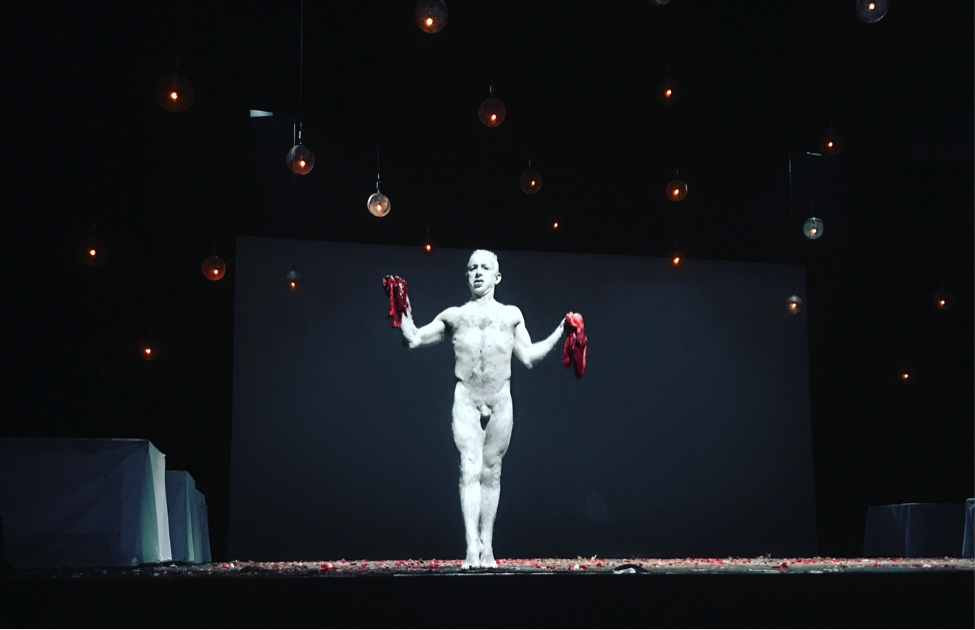
#########
throughout the last decade, since i started working as a professional artist, i’ve watched theatre flail around trying to cope with a whole new existential threat. i’ve flailed along with everyone else. we’re no longer just the abacus to the calculator, we’re dealing with quantum computing. cinema is going to have to compete with augmented reality. if the abacus was quaintly outdated before, it seems downright useless now. for the most part, we just keep handing it to students, making them recite their absurd times tables, insisting that there is some intrinsic moral value. “it’s good for you.” “it builds character.” “it makes communities better places to live.” “it brings communities together.” “it leads to health and well-being.” “it’s effective against several tick-borne illnesses.”
a number of trends have emerged in attempting to adjust to this seismic movement in our cultural life. many artists have picked up on the “age of the self” and begun creating work that eschews fiction for autobiography. a few years ago there were three shows at the PuSh festival that featured men onstage with their (real live) mothers. theatre has gradually shifted from being about kings and queens, to the bourgeoisie, to the working (hu)man, to the artist themselves. subject positioning has become critical to art-making in the age of post-structuralism and intersectionality.
other works have tried to stage the new technologies themselves. recent efforts have been scripts that read as facebook feeds, staged memes, or devised pieces created entirely from reddit threads. other pieces are devised as improvised experiments making use of social media platforms—tweet-in choose-your-own adventures, shows that only take place on youtube, chat roulette experiments, and real-time facebook purges. a problem with these is that they don’t age well: re-reading patrick marber’s closer and the chat room scene in 2017 produces a squeamish embarrassment at its painful datedness (though i’m sure in a few years that will be replaced by period-drama nostalgia, akin to references to phonographs and horse-drawn carriages).

in addition, there are lots of ways in which theatre organizations are trying to make use of social media and online content to broaden marketing and outreach and create additional access points for audiences. rehearsal videos and trailers, reddit AMAs, show-specific hashtags, and (case in obvious point) additional content and artistic discourse posted on blogs.
i don’t really want to comment on the merit of any of these approaches, i’m just trying to summarize some of the flurry of attempts to get with the times. some of the pieces i’ve referenced above have been moving or successful or engaging, some not. i’ve participated in the flailing too—some of the examples above are from my own work. when i observe any of these succeeding, it’s usually because there is an essential conceptual way in which artists and institutions make use of them, rather than using them as gimmicks, or grudgingly accepting twitter as the modern yoke of bondage all creative professionals must bear, desperately chirping along while nazis roar unchecked.
########
i didn’t sign up for any of this shit when i went to theatre school. i had these grand (quaint) illusions of training, becoming a director, slogging it out for a bit in the indie wilderness, and then at some point being granted a golden key and happily working my way around various theatres getting to practice my craft interpreting “great texts,” getting to bury my head in musty philosophy books that have that smell, reading JSTOR articles in the bathtub, and at some point becoming a well-dressed and erudite old fag with a nice body of work and a mischievously lecherous wit for a man of my age. it was going to be great. i was totally ready to be an abacus in the age of calculators. i was fine with working in a charmingly antiquated art form. nobody told me i was going to have to tweet—much less while my profession clings to survival in an age where the very institutions i hoped to work at looked increasingly irrelevant.
(somebody take me to an anti-uber protest and get me a sign).
what i can say about the emergent approaches i mentioned above is that so far i have not seen much evidence that suggests that they are building a momentum that is turning the declining numbers around in a general trend. when they are successful at galvanizing audiences, those successes tend to be one-offs. like it or not, as theatre artists, we have to reckon with the fact that the idea of theatre in general, as we are practicing it now, is not producing significant meaning for our public.
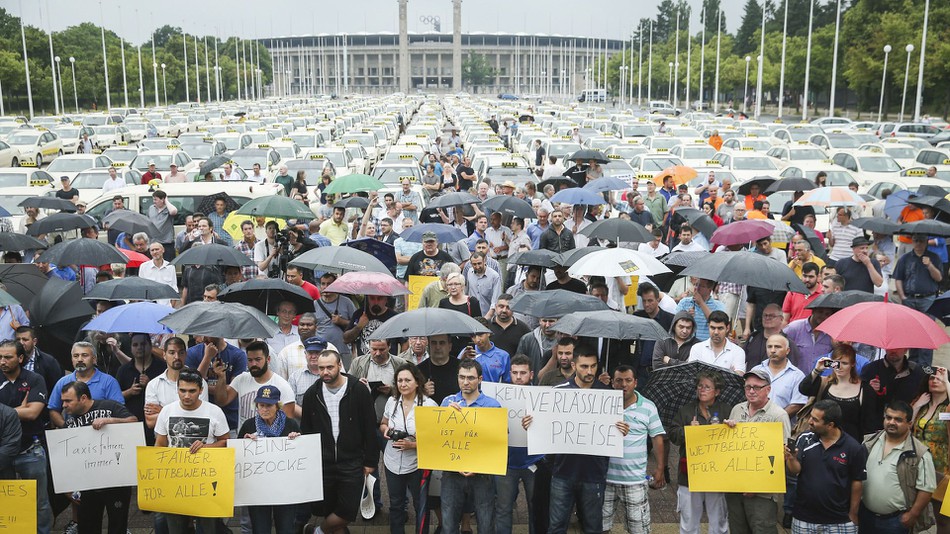
##########
lately, i’ve been trying to figure out my own way forward in this disappearing landscape, a way to stop feeling like a climate denier on a melting ice floe. i’ve been thinking a lot about the kinds of experiences that actually produce meaning for the general public. even if institutional theatre is shrinking, perhaps even disappearing, i believe that fundamentally people will always have a need for liveness and performance.
last week, i went to belgrade (serbia) for the belgrade international theatre festival. jan fabré’s MOUNT OLYMPUS TO GLORIFY THE CULT OF TRAGEDY was headlining, and i was in belgrade in july and wanted an excuse to go back. i’d heard crazy things about fabré’s 24-hour long epic orgy of raw meat and glitter and dicks everywhere, so i booked the tickets in august.
people who have me on their facebook or instagram saw me posting throughout the show, and i don’t want to do a recap here, so i’ll just plug @thisisnttaedon here to shamelessly whore for followers if you want to get in on the experience.
what was truly astonishing was how all of belgrade seemed animated, activated, and proud as hell that this extraordinary work had come to town. you may have heard that serbia isn’t the most queer-friendly nation in europe, and this is just about the gayest thing that has ever been on a stage (complete with a fisting scene), so it was all the more incredible. the sava centar had camera crews from the national television station broadcasting the experience, and in the few intermissions they were interviewing audiences (yes there were complaints about all the dicks on national TV). people who couldn’t score the highly-coveted tickets had viewing parties in their apartments. lasting the whole night was highly competitive—people i met kept telling me how long their friends made it for (i didn’t meet anyone else who managed the whole damn thing but i know i wasn’t the only one).
what struck me about all this, this undeniable success of a highly-experimental work, was that the people of the city felt a sense of OWNERSHIP over the work, and those who attended had ownership over their experience, which they transmitted to their own spectators (myself included—i was shocked how many people seemed to follow my 24-hour journey through the piece).
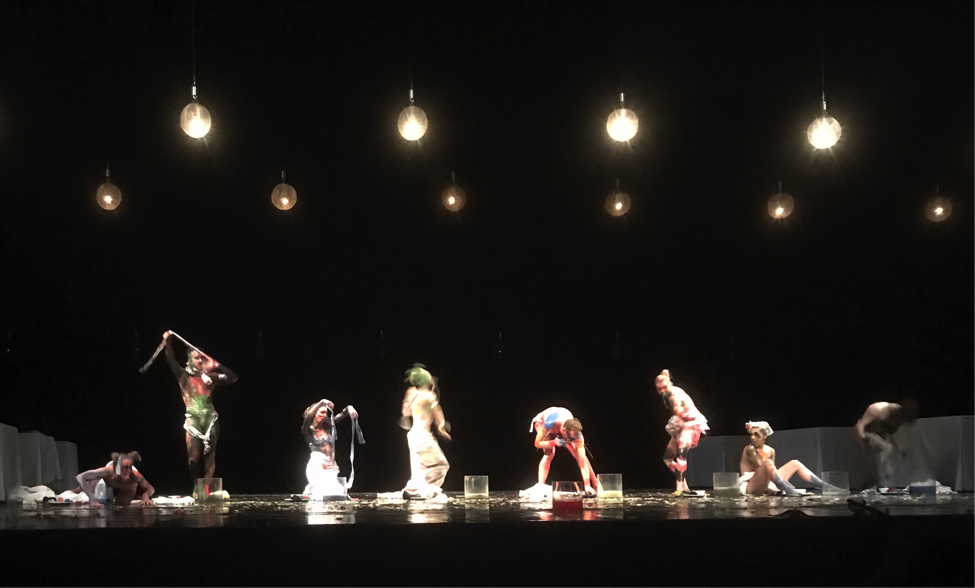
########
there’s a meme that went around facebook a couple weeks back, something about millennials and museums. it starts with a bad cliché of a millennial queer and his girl-friend who see a work of art as a selfie backdrop rather than an art object. it’s heavily ironized and obviously disdainful, but not entirely unfair, given that a $200M work of art was destroyed by a woman’s epic failure of a selfie. but apparently, museum attendance is up among millennials, owing partly to the rise of art-selfies, according to nerve.com.
the nerve.com article actually includes a chart that’s drawn from a 2014 culture track report, which includes a few interesting pieces of information:
- while museum attendance is up “dramatic theatre” attendance is down by 8% from 2011
- millennials are actually the most likely demographic to attend more than 3 cultural events in a month.
- boomers were the most likely demographic to attend no cultural events in a month.
while the first of these is no surprise to me—i’ve been in the theatres watching this happen; the second two stats did surprise me—probably because i’ve been in the theatres where this isn’t happening.
########
back to jones’ article: there’s a radical shift in how digitization is enabling us to engage in culture. people want more ownership over their experiences, and theatre as it is practiced right now doesn’t often offer that.
just this past week, here in berlin, a protest organization called “from dust to glitter” occupied the the volksbühne, one of the five state theatres here. they were acting upon widespread anger at the previous city government’s choice of artistic director. the new guy, chris dercon, is a belgian museum curator, who is trying to make an institution literally called the “people’s stage” into an international touring house. the protestors threw all-night parties and drew up a plan to fill the theatre with programming over the coming months (while dercon didn’t have anything programmed until november anyway). they hung a banner across the pillared facade that roughly translates to “but art indeed.” on thursday, police removed the protestors after a six-day occupation, but if the message wasn’t clear before, it is now: this stage belongs to the community.
germany might be a special case, but i have seen that sense of ownership translate in electric ways back in canada. the youth/elders project, which evalyn co-created at buddies last season, was an incredibly moving piece of theatre that played to full and emotional houses. equally exciting to the piece itself was being around buddies for several weeks and months leading up to the production. the group made themselves at home in the building, and the theatre felt active and alive, an influx of new energy. the piece brought audiences in who weren’t regular audience members—i suspect in part because they felt a sense of ownership and empowerment at the voices and stories being represented on the stage.
last summer, i had the great privilege of being asked to direct a high park shakespeare for canadian stage. it was my second time doing the gig. it would be way too easy to take a snobbish stance about park shakespeare, and some people who know me might even assume i would. but being asked to direct that slot is an immense honour. the hill is packed with audiences all summer long, many of whom are not regular theatre-goers, some who’ve never seen a play before. they bring picnics and show up early to watch fight call, take photos of the set, and generally set up camp. it’s one of the most diverse audiences in the city, and they’re there because that theatre experience belongs to the community. it’s one of the few theatre spaces where attendance continues to break its own records annually.
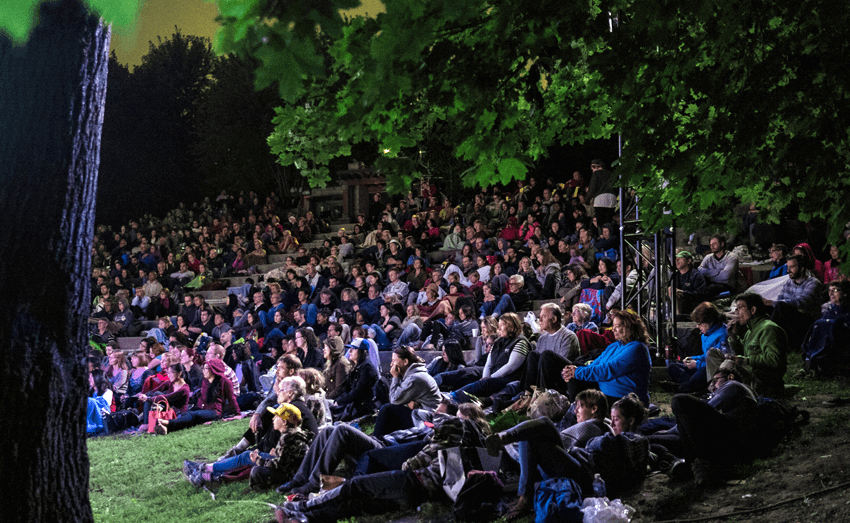
#########
jones’ article has a certain tone of fatalism hanging over it. de-professionalization and social media has left theatre critics vulnerable too—the national post just discontinued its theatre coverage last week.
i have the additional concern that the age of the self(ie) has a distinctly neoliberal aspect to it. the advent of the internet coincided with one of the most frighteningly inhumane eras in economic thought, and beyond the obvious humanitarian damage done by modern worship of the free market, an insidious secondary effect of neoliberal beliefs has been a dramatic rise in the importance of the self, while the value of collectivity and the common good have diminished. when we are actively casting ourselves as increasingly-important protagonists in our own narratives, as smart phones and social media allow us to do, it’s not hard to anticipate a declining capacity for empathy, as several studies have demonstrated.
throughout his article, jones repeatedly cites the source of many of these ideas: a keynote address given by dr. steven tepper at a conference hosted by zòcalo public square in LA in june.
where jones is resigned, tepper is inspired. jones complains that the radical democratization of culture means we’ll have to open-source everything, but tepper is palpably excited by the rapidly spreading waves of cultural change emanating from the impact of digitization and the age of the “curatorial me.” tepper compares our massive not-for-profit arts hubs to the catholic churches that luther disrupted with the transmission of his 95 theses throughout europe.
have we as arts professionals become like dominican friars enriching ourselves by selling get-out-of-hell-free indulgences to those wealthy enough to buy their salvation through the morally-upright attendance of cultural events? it sounds at once totally absurd and completely à propos to me. on the one hand, we’re obviously not selling them for enough money considering how hard it is to cobble together an income as a freelancer. on the other, tickets are prohibitively expensive for many other than upper-middle-class boomers who, as we have learned, are the least likely consumers of culture.
where tepper finds hope, and based on my experiences in the past year i’m inclined to agree, is in a growing hunger for what he calls “bigger than me” experiences:
“i think there are ‘me’ experiences and i think there are ‘bigger than me’ experiences, and both are important. ‘me’ experiences begin with the question, ‘what do i have to say?’ or ‘what do i want to say?’ ‘bigger than me’ experiences begin with the question, ‘what can i learn?’ or ‘what should i know?’ ‘me’ experiences tend to be about pleasure, hedonic pleasure, and ‘bigger than me’ experiences are about purpose more than pleasure. we call that eudaemonic pleasure—happiness that’s organized around a greater purpose in life. ‘me’ experiences are about doing, putting it out into the world, and ‘bigger than me’ experiences are about what john dewey would call ‘undergoing,’ having a transformation in how you think or feel or see, having a narrative arc that takes you to a different place. ‘me’ experiences are about identity, and ‘bigger than me’ experiences are about identification. ‘me’ experiences are about the egoistic imagination, who you can be and who you can imagine yourself to be. ‘bigger than me’ experiences are about the empathic imagination, imagining who someone else is or who they can be.”
tepper identifies millennials as valuing authenticity, diversity, purpose. he cites the slow-down economy and the astonishing rebound of vinyl sales as proof. but above all, he points to the boom in participatory, immersive music festival experiences as evidence that our generation is hungry for live, connected experiences of culture.
########
i guess this takes us back to where it all began. wasn’t the city dionysia in ancient athens a massive three-day long festival with a line-up of top-notch artists, in an overheated outdoor space with poor access to sanitation and widespread sex, drugs, and drinking?
my experience in belgrade with MOUNT OLYMPUS was a collective one. the sava centar had bean-bag chairs, a sleeping area, a restaurant, a bar, and even a charging station with wifi provided by a local telecom company. there was a sense that we were undergoing something, not only with the performers, who put their bodies through unbelievable feats, but with each other. we’d come for a festival, after all, and this one was hosted by dionysus in gold body paint. i don’t know if anyone got laid in the bathrooms there but i sure hope some one did. the applause lasted half an hour.
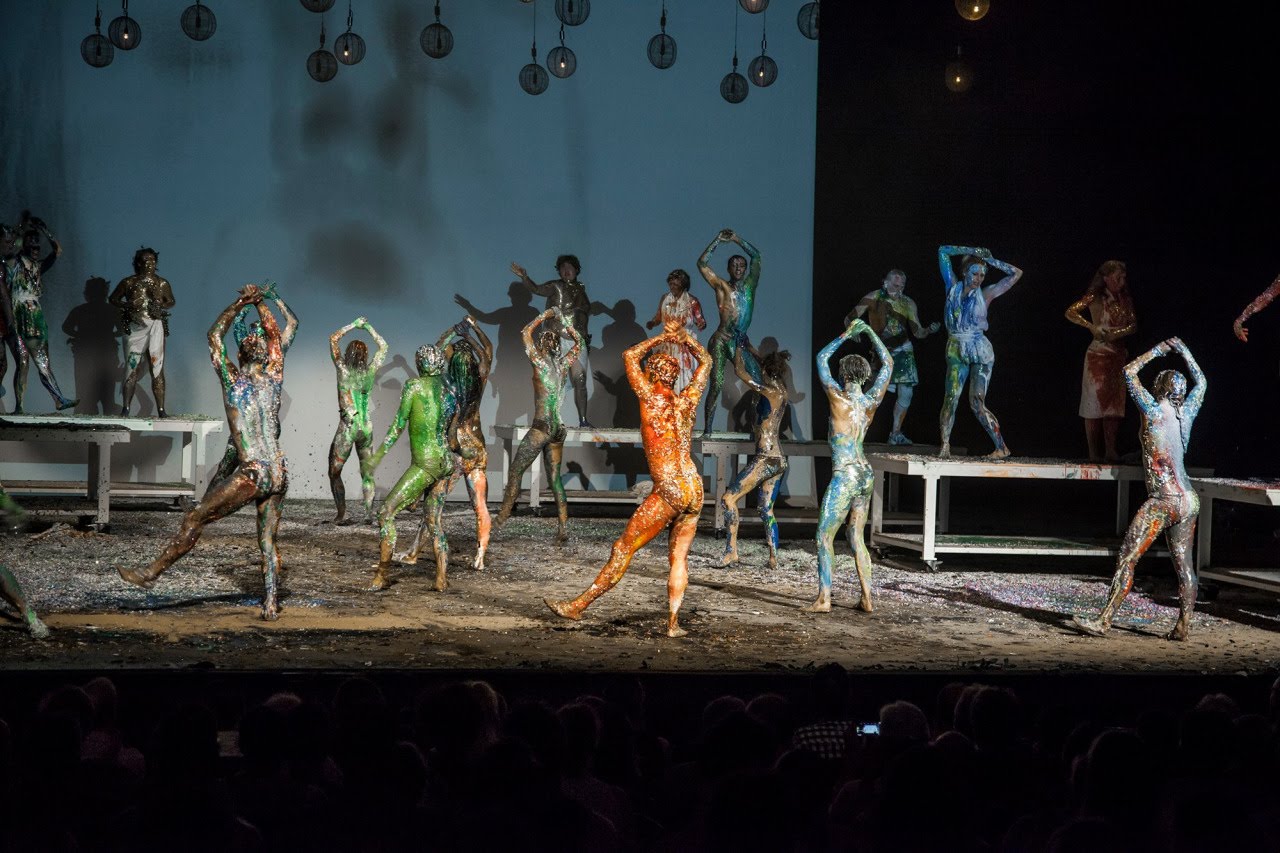
the radical democratization of art doesn’t mean the amateurization of the entire arts field, as jones (and the taxi drivers protesting uber) might have us believe, but it means that we need to be creative about finding new ways for audiences to access art, and give them ownership of it. there’s no point in trying to resist the disruption of professionalization as we know it—it’s already been disrupted.
this means letting go of my old image of the profession i trained for, and was pretty excited to pursue. i can readily admit to the temptation of grumbling, and wanting to just keep on doing what i feel like i’ve gotten pretty decent at with practice, while lamenting toronto’s contracting theatre audience (and griping about twitter). that’s the strategy that found me exhausted, angry, and hopeless at the end of a year that was by all accounts fairly productive. i really do like the musty smell of german philosophy books. but i’d rather not stand here on my melting ice floe shouting to the 6 people who bought tickets, “out of my cold dead hands.”
(meanwhile on facebook, the volksbühne’s ever-more-astonishingly tone-deaf facebook page has changed their cover photo to a picture of the theatre with a banner that simply reads: “in spite of everything!”).
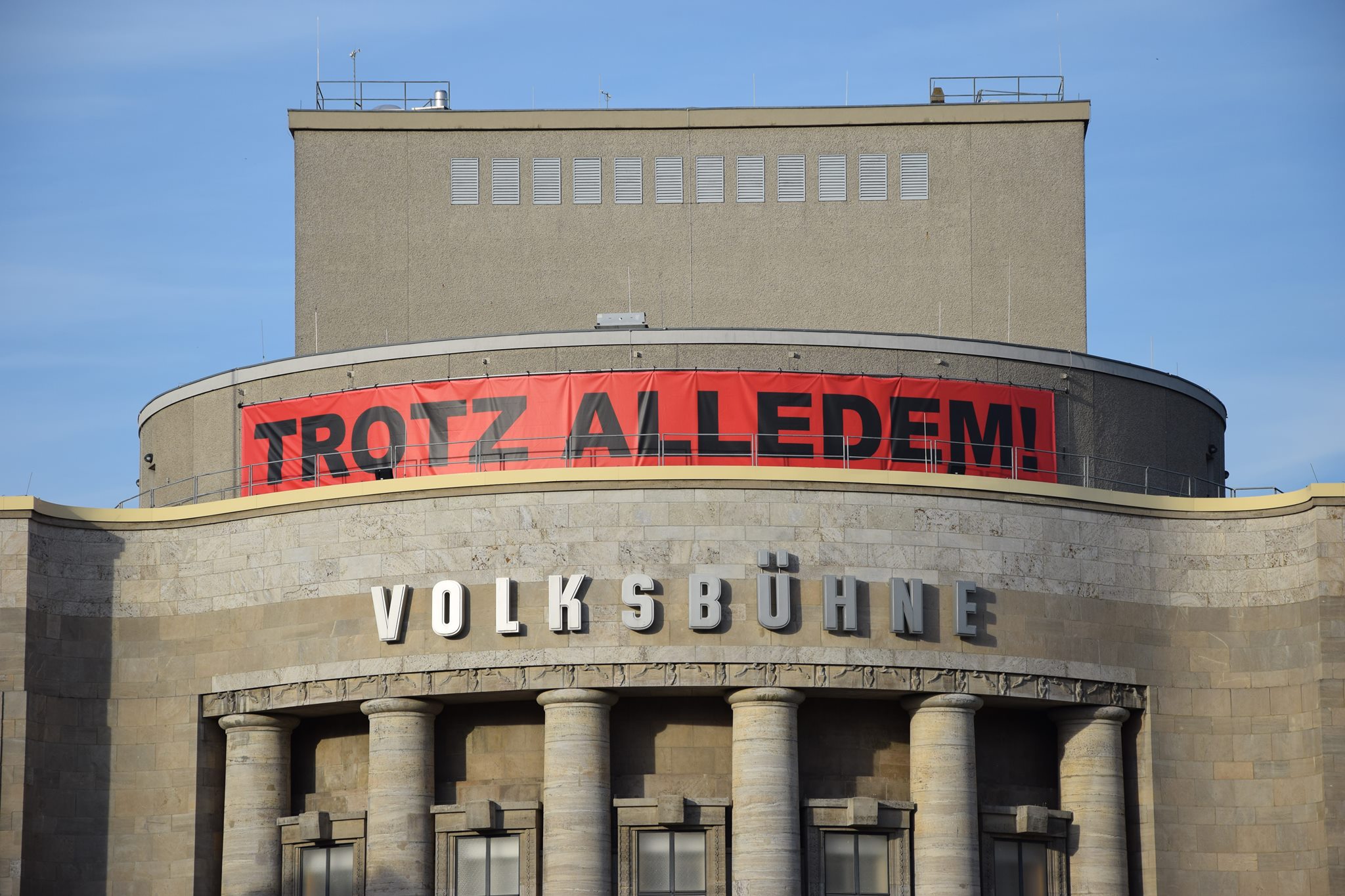
no one is arguing that the answer is lifting the no-phones-during-the-show taboo across the board, and letting people take distracting selfies with their backs to the stage. the same part of me that likes abacuses and musty books will maintain that the theatre has the distinct advantage of being one of the last unplugged spaces. nor do i see the answer necessarily being more audience participation either—there’s a horrible panic that often washes over an audience member’s face when they’re approached by a performer who’s about to participate AT them. live participation can be terrifyingly disempowering when it’s in the service of the show rather than the individual being asked to engage.
but people want to experience culture differently these days. they want greater access, both to the process and the product, they want to be a part of an event, immersed in something—they want an authentic experience. i was listening to ben mccarthy’s interview with jacob wren on his podcast “precariat content” today. wren at one point defined authenticity as “something that makes me feel alive.” i like that definition because there’s still room in it for fiction and epic, as well as intimacy and biography.
in the examples of successful theatre events i’ve gone through, there is something interesting that they all share. none of them actively or overtly incorporate social media or digital technology in a high-concept way. the volksbühne occupation, mount olympus, the youth/elders project, and shakespeare in high park all succeed as compelling theatrical events without requiring participation via twitter. the tweeting is all extrinsic to these events, which still succeed on the level of the abacus, but can get quantum-computed about later. the most famous example of theatre in age of the self—were you wondering when i’d get to punchdrunk’s “sleep no more?”—also relies on intimacy, presence, and collectivity. the closest you’ll get to a selfie in front of the mckittrick hotel, or a pic of your hard-to-score tickets.
tepper’s music festival analogy appeals to me, because there’s still a very important role for artists and curators to play within that structure. skilled, virtuosic artists are still the main event, and there’s even more pressure on curators (organizers) to think through all the logistics of how audiences are going to access the art on display. but there’s an equally essential role that the audience plays in festivals: creating their own costumes (please, no more headdresses), making the trek out of their comfort zones, planning meals, setting up camp—and at festivals like burning man (love it or hate it—i’ve actually never been) contributing an aspect of the experience to the group you’re with.
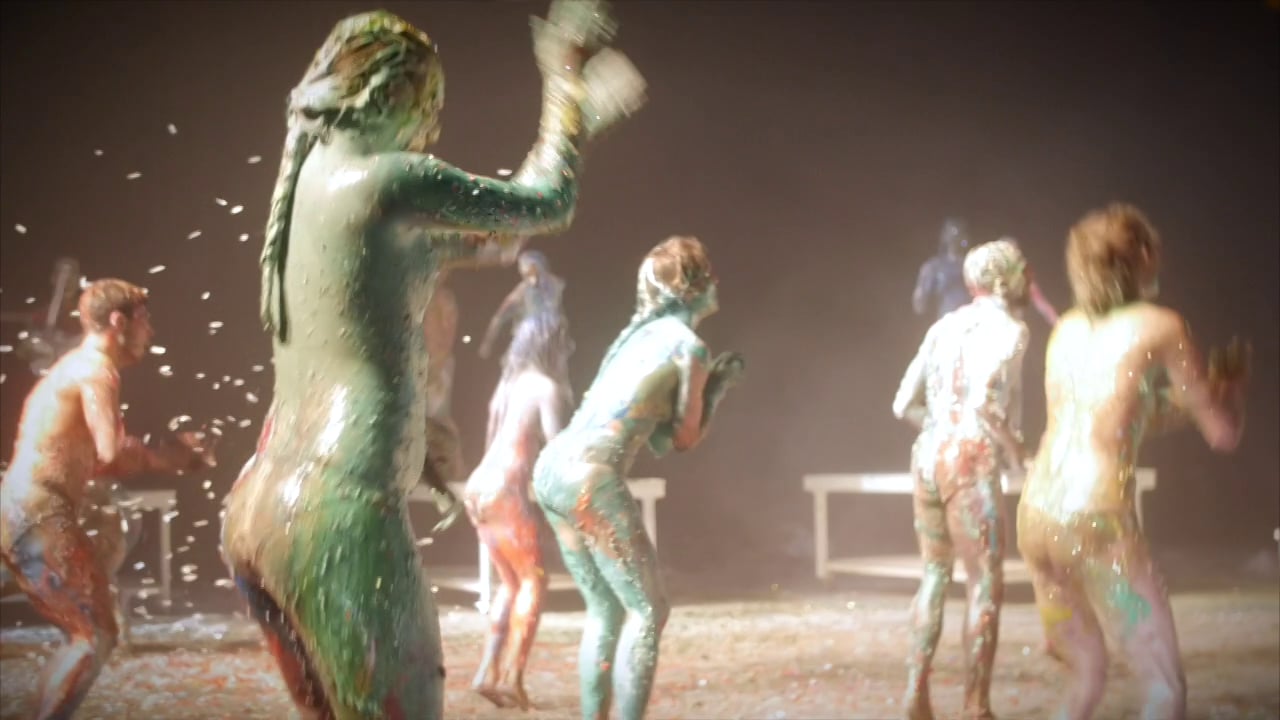
########
this doesn’t end with a blueprint for the future. i don’t have a 12-point plan. i don’t even know whether arts institutions as we know them will necessarily survive in a world that is changing our relationship to arts, media, and culture at a dizzying rate. but if they are to, they’ll have to go through a counter-reformation of their own, and it’s going to involve more than just having a well-maintained instagram account. it’s going to take a rethink of the very ways in which they expect audiences to engage with their work.
october 31st will be the 500th anniversary of luther nailing his 95 theses to the wittenberg church door. there are still catholic churches, and i’m told people still go to them, but i don’t know many who do. the democratization of western religion, once started, was irreversible, and i know a lot of people who mediate their relationships with spirituality in an individualized, ever-morphing way.
what i do know is that over the past year, the way i think about the value of art has been shifting, and with it, so has the kind of art i’m interested in making. i also know that while sitting at the belgrade airport, for the first time in a long time, i felt a bit of optimism that my conviction in the human need for live, collective experiences isn’t a figment of my eccentric imagination.
i don’t buy the argument that twitter has killed our attention spans, and theatre is just drifting into obsolescence as a result. in fact, i am convinced that the neoliberal age of the self(ie) is making us hungry for intimacy, for extraordinary experiences, for the kind of authenticity that makes us feel alive, and connected, and seen by each other. i think people are tired of being expected to consume the status quo—perhaps kickstarter is a good indication that people are tiring of average products and taking advantage of the digital age to seek out the kind of extraordinary products that fill gaps in what is otherwise on offer. it seems to me that people want theatre that is radically inclusive. beyond simply barrier-free access and visible diversity, people want to be involved, they want their experience at the theatre to become part of their story of themselves, they want to be asked to make a commitment beyond sitting still and not unwrapping candies in the dark. my experience in serbia was exactly that.
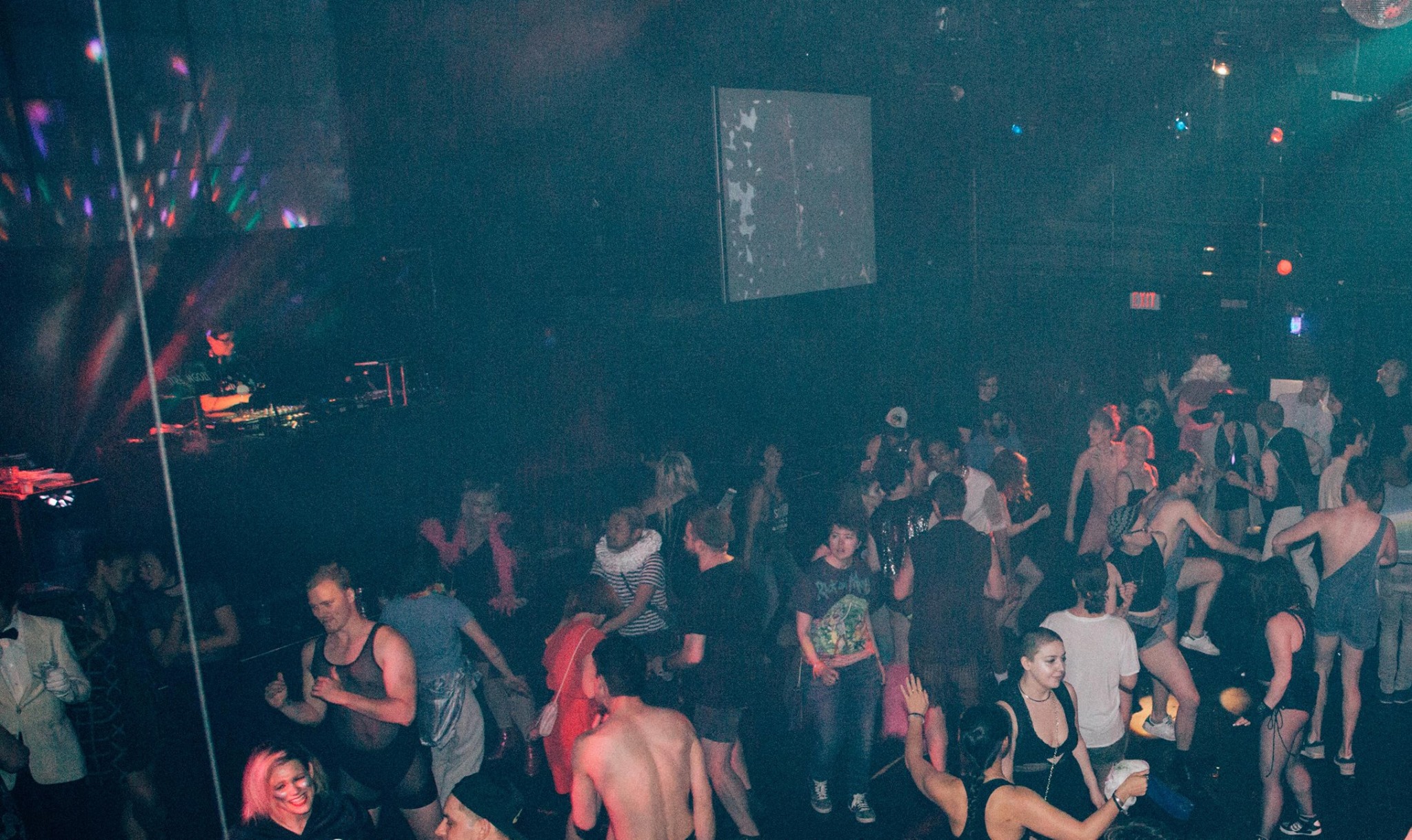
this past summer, i had the immense joy of collaborating with some of my favourite people to throw a big costume party at buddies for pride. i was really moved by how many people were excited to dress up, get down, eat some oysters, and get tattoos. i loved hearing about people’s different journeys through the night, surprising and intimate moments with strangers, discoveries in dark corners, friends they made and costumes they put on. i loved being in a theatre full of people leaning in to an experience, participating joyfully, instead of with terror in their eyes. i’d like to do more of that—it really felt like it meant something to people. i hope you’ll come next time.
until then, here’s a bootleg of a dick dance from mount olympus, as a reward for reading so far.

